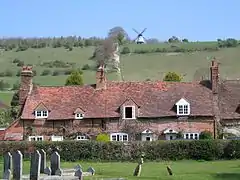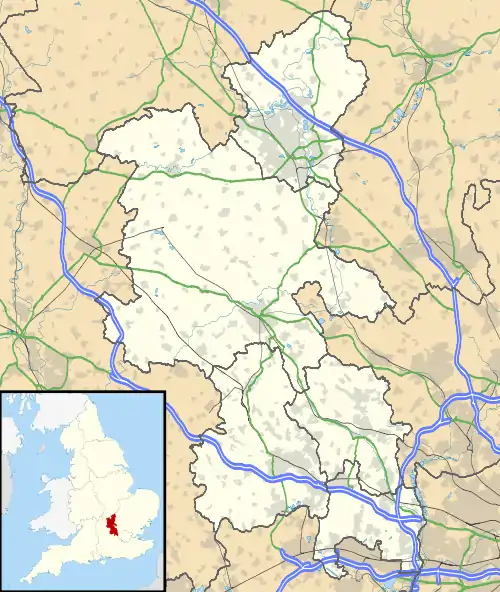Turville
Turville is a village and civil parish in Buckinghamshire, England. It is in the Chiltern Hills, 5 miles (8.0 km) west of High Wycombe and 5 miles (8.0 km) north of Henley-on-Thames. The name is Anglo-Saxon in origin and means 'dry field'. It was recorded in the Anglo-Saxon Chronicle in 796 as Thyrefeld.
| Turville | |
|---|---|
 Houses in Turville, with Cobstone Windmill in the background | |
 Turville Location within Buckinghamshire | |
| Population | 340 (2011 Census)[1] |
| OS grid reference | SU765915 |
| Civil parish |
|
| Unitary authority | |
| Ceremonial county | |
| Region | |
| Country | England |
| Sovereign state | United Kingdom |
| Post town | HENLEY-ON-THAMES |
| Postcode district | RG9 |
| Dialling code | 01491 |
| Police | Thames Valley |
| Fire | Buckinghamshire |
| Ambulance | South Central |
| UK Parliament | |
The manor of Turville once belonged to the abbey at St Albans, but was seized by the Crown in the Dissolution of the Monasteries in 1547. The manor house has since been rebuilt as Turville Park, and was held by the Hoare Nairne family for most of the 20th Century. The present incumbent of the manor is Lord Sainsbury. Turville was home to Ellen Sadler, who fell asleep in 1871, aged eleven, and purportedly did not wake for nine years, becoming known as the "Sleeping Girl of Turville". The case attracted international attention from newspapers, medical professionals and the public. Rumours persist in the region that Sadler was visited by royalty for a "laying on of hands".[2][3] The local pub is the Bull and Butcher.[4] Turville Hill is a Site of Special Scientific Importance, and it includes Cobstone Windmill.
Notable people
- Geoffrey de Turville (died 1250), Lord Chancellor of Ireland
- Charles François Dumouriez (1739-1823), French royalist general
- Ellen Sadler (1859-1901), tourist attraction
- Lord Sainsbury of Turville (born 1940), businessman, politician, and philanthropist
- Sir John Mortimer, (1923-2009), Barrister, playwright, novelist
Location for filming
The 1942 Ealing Studios film Went the Day Well?, in which German paratroopers invade a small English village, was filmed in Turville, as were many of the scenes from the 1963 comedy film Father Came Too!. The whole of " The Large Rope" - a 1953 B-movie starring Donald Houston, was filmed in the village. Additionally many of the outdoor scenes of television show Goodnight Mr Tom were filmed in Turville, as was the dream scene in Bride and Prejudice, and a brief scene from I Capture the Castle.
Scenes have also been shot in the village for Midsomer Murders, Lewis, Marple, "Foyle's War", the 2008 Christmas special of Jonathan Creek, the British drama An Education and the 2009 BBC adaptation of The Day Of The Triffids. Cobstone Windmill in the neighbouring parish of Ibstone, used in Chitty Chitty Bang Bang, overlooks the village of Turville.
The village was the location for outdoor scenes in the sitcom The Vicar of Dibley. In the series, the church of St Mary the Virgin was renamed "St Barnabus" (sic).
A few scenes from Little Britain were filmed in the village.
The music video for the song "Apparition" by Stealing Sheep was shot in the village.[5]
The fourth episode of the first series of Killing Eve was shot in the village.
References
- "Civil Parish population 2011". Neighbourhood Statistics. Office for National Statistics. Retrieved 25 November 2016.
- Barham, Tony (1973). Witchcraft in the Thames Valley. Spurbooks. pp. 20–27. ISBN 9780902875371.
- Staff (6 November 2009). "Our very own 'Sleeping Beauty'". Bucks Free Press. Gannett Company.
- The Bull and Butcher website
- "Let mysterious Morris dancers take you elsewhere in this bizarre music video". Boing Boing. Retrieved 20 October 2015.
